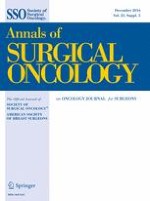Erschienen in:

19.09.2016 | Gastrointestinal Oncology
Long-Term Survival in Patients with Postoperative Intra-Abdominal Infectious Complications After Curative Gastrectomy for Gastric Cancer: A Propensity Score Matching Analysis
verfasst von:
Keiichi Fujiya, MD, Masanori Tokunaga, MD, Keita Mori, MSc, Rie Makuuchi, MD, Yutaka Tanizawa, MD, PhD, Etsuro Bando, MD, PhD, Taiichi Kawamura, MD, PhD, Masanori Terashima, MD, PhD, FACS
Erschienen in:
Annals of Surgical Oncology
|
Sonderheft 5/2016
Einloggen, um Zugang zu erhalten
Abstract
Background
It has been reported that postoperative complications after curative surgery for gastric cancer adversely affect long-term survival; however, postoperative complications may confound other patient characteristics or tumor factors associated with survival outcome. In the present study, covariates were adjusted by propensity score matching to clarify whether postoperative complications truly affect survival outcome.
Methods
The present study was performed on 1541 patients who underwent curative gastrectomy for gastric cancer between 2002 and 2009. Patients were divided into two groups based on the occurrence (174 patients) or absence (1367 patients) of postoperative intra-abdominal infectious complications. Survival outcomes were compared between groups using propensity score matching analysis.
Results
Most clinicopathological characteristics differed significantly between the two groups, but these differences disappeared after propensity score matching. After matching, overall survival was significantly poorer in patients with postoperative intra-abdominal infectious complications [hazard ratio (HR) 1.43, 95 % confidence interval (CI) 1.02–2.00; p = 0.036], as was relapse-free survival (HR 1.42, 95 % CI 1.03–1.96; p = 0.034).
Conclusions
Intra-abdominal infectious complications adversely affected survival outcome when patients were matched by propensity scores, which included demographic data as covariates. Thus, it is important to avoid the development of intra-abdominal infectious complications to improve long-term survival.











